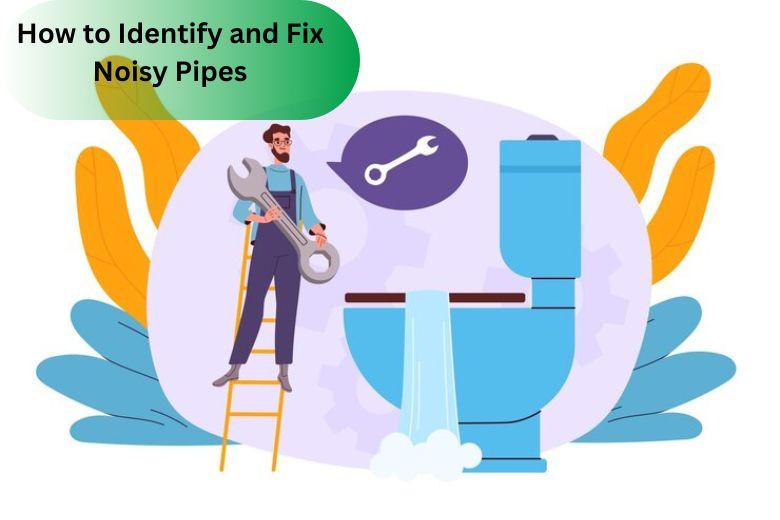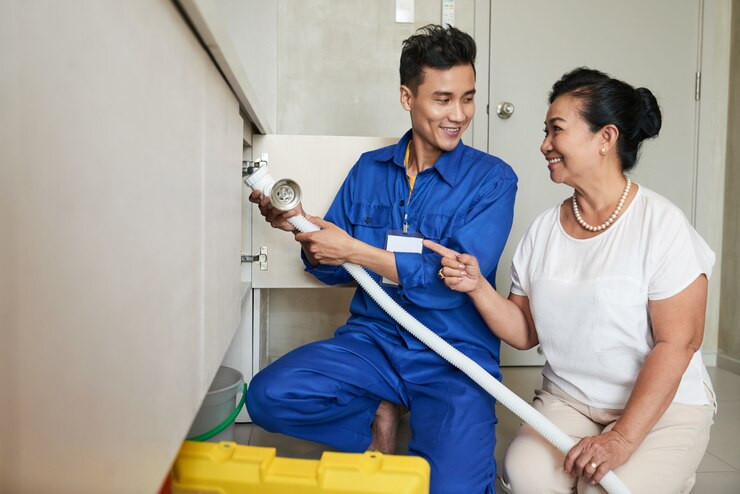How to Identify and Fix Noisy Pipes
Posted on September 19, 2024 by Admin

Though irritating, noisy pipes may indicate serious issues with your plumbing system. Knowing how to identify and fix noisy pipes may save you from potential damage and keep the peace in your house intact. Common causes of noisy pipes and effective solutions on how to handle them are discussed below.
Common Causes of Noisy Pipes
1. Water Hammer:
The shock wave travels through pipes once there is a sudden stoppage of the water flow or its direction changed, producing a loud banging noise. In most cases, it occurs when a valve closes rapidly.
2. Pipe Vibrations:
Vibrations from not properly fastened pipes rub against the walls or another surface and cause a rattling or buzzing sound. This might be caused by loose brackets or hangers.
3. High Water Pressure:
If the water pressure is too great, then of course banging or whistling pipes will ensue. This mostly happens when the standard residential plumbing 60-80 psi is overridden.
4. Loose Pipes:
With time, obviously, pipes are going to loosen, thereby causing them to move and make noise. It causes a rattling or clicking sound every time the water moves through the pipes
5. Air in Pipes:
Gurgling or bubbling noises are created as air is trapped inside the pipes. It often results from problems within the venting or airlocks of the system.

How to Identify and Fix Noisy Pipes
1. Diagnose the Source of the Noise
First of all, diagnose the type of noise and where it is originating from to correctly identify and fix noisy pipes:
Water Hammer:
If you shut off a faucet or valve and hear a banging noise, it may be a water hammer. Shut off the nearest shut-off valve and listen for the noise.
Pipe Vibrations:
If the noise resembles more rattling or buzzing, then see if pipes are loose or touching walls. Tap on the pipes and listen for changes in sound.
High Water Pressure:
Mount a pressure gauge onto a faucet, which will show the water pressure. If it's above the recommended range, then it might be high water pressure that causes it.
Loose Pipes:
Check visible pipes for any loose brackets or supports. Gently move the pipes to check if they rattle or shake.
Air in Pipes:
If you hear gurgling or bubbling, then trapped air is probably the cause. Seek an air vent; inspect for airlocks.
2. Apply Solutions for Noisy Pipes
For Water Hammer:
Install water hammer arrestors whose functionality involves absorbing shock to avoid the banging noises. Installing them near problem areas washing machine valves and main shut-off valves can help counteract the effect.
Pipe Vibrations:
More securely mount the mobile pipes with additional brackets or pipe clamps. Ensure all pipes are set to have less displacement or vibration.
High Water Pressure:
Check pressure through a PRV installed on the main water line to help in maintaining stable pressure within the recommended range.
Loose Pipes:
Tighten or replace loose brackets and hangers. Be certain that pipes are safely secured and don't touch walls or other surfaces.
Air in Pipes:
The trick here is to bleed the system by opening your highest and lowest faucets in the house. Hopefully, this discharges some of the trapped air and the system pressure is returned, restoring flow.
Conclusion
Diagnosing the cause and repairing the noisy pipes are essential in ensuring a quiet and trouble-free plumbing system. Making a diagnosis of the noise and then applying the appropriate fixes will go a long way in resolving common plumbing issues and avoiding further damage. Don't hesitate to reach out to a professional plumber if you are unsure of the cause or the fix. Fixing noisy pipes quickly will restore peace in your house and, more importantly, make your plumbing system healthy.
Also Read :
The Benefits of Professional Drain Cleaning vs. DIY Methods
How to Prevent Water Damage in Your Home
How to Integrate Home Automation Systems with Existing Electrical Systems
How to Finance Your Roof Replacement: Loans, Grants, and Insurance
Roof Safety Tips for Homeowners
The Impact of Algae and Moss on Your Roof
How to Deal with Roof Leaks During a Storm
How to Create an Electrical Maintenance Plan for Your Home
Faqs
-
1. What are some of the reasons for noisy pipes?
Noisy pipes may be caused by the hammer effect of the water, vibrations in the pipe, excessive water pressure, loose pipelines, or maybe some entrapped air in the plumbing system.
-
2. How do I know when my pipes are suffering from water hammer?
Water hammer is the loud banging noise occurring when a faucet or valve is shut off. Determine whether or not the noise originates when the water flow is suddenly stopped.
-
3. What can I do about vibrating or rattling pipes?
Check for loose brackets and/or hangers and tighten them. Be sure that pipes are securely fastened, not permitting too much movement, thereby resulting in less noise.
-
4. How does high water pressure affect pipe noise?
High pressure also causes the banging of pipes or a whistling noise. If the measurement with a gauge turns out to be great, then a pressure-reducing valve shall be installed.
-
5. How do I resolve air trapped in my pipes?
If you turn on the lowest and highest faucets in your house and let them go with air coming out of the systems, this should return the flow back to normal.
-
6. Should I hire someone to fix noisy pipes?
If the cause for the noisy pipes or the solution is uncertain, then it would be highly recommended to hire professional help. That way, a professional plumber will be able to diagnose the problem precisely and solve it.
Recent Post
- Top Plumbing Service Providers in Arizona, USA
- Top 10 Electrician Service Providers in Alabama, USA
- Top 20 Roof Repair Service Providers in Alabama, USA
- The Role of Roof Insulation in Energy Efficiency: Tips and Tricks
- Understanding Roof Damage from Wildlife and How to Prevent It
- How to Choose the Best Roofing Contractor for Emergency Repairs
- Roofing Maintenance for Historic Homes: Preserving Architectural Integrity
- The Importance of Proper Attic Ventilation for Roof Health
- How to Identify and Prevent Roof Mold and Mildew
- The Best Practices for Removing Snow from Your Roof